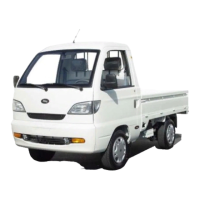
Do you have a question about the Mag International T-MAG XC Series and is the answer not in the manual?
| Brand | Mag International |
|---|---|
| Model | T-MAG XC Series |
| Category | Trucks |
| Language | English |
Details vehicle speed, grade ability, fuel consumption, and turning diameter.
Provides curb mass, gross vehicle mass, and seating capacity.
Lists overall length, width, height, wheelbase, track, and overhangs.
Details engine model, type, displacement, bore, stroke, and fuel type.
Describes the location of the vehicle's name plate.
Specifies where the engine number is stamped on the vehicle.
Indicates the location of the VIN stamped in the engine cabin.
Identifies external components like hood, lights, windows, and tires.
Details dashboard switches, dials, and gauges.
Highlights key interior elements: mirrors, steering wheel, and seats.
Illustrates major engine components: oil filter, engine, ignition coil, and battery.
Explains methods for locking and unlocking vehicle doors.
Covers window operation, mirror adjustment, and sun visor use.
Provides instructions for adjusting seats, headrests, and seatbacks for safety.
Details the proper use and function of the vehicle's seat belt system.
Explains the function and operation of the ignition switch and its positions.
Describes dashboard warning lights and interior dome light operation.
Explains the combination meter, tachometer, speedometer, and gauges.
Details the operation of the rear window defogger switch.
Covers the use of the cigarette lighter and the vehicle's ashtray.
Explains the functions and operation of the vehicle's air conditioning system.
Describes how to open and close the vehicle's glove box.
Information on operating the AM/FM electronic tune tape radio player.
Details the location and operation of the parking brake lever.
Guide to engaging and operating the 4WD system, including high/low gears.
Discusses the vehicle's emission control system and catalytic converter.
Lists essential checks for windows, tires, fluids, and safety equipment.
Provides warnings for driving on uneven or continuous surfaces.
Step-by-step instructions for starting the vehicle's engine safely.
Explains gear shifting procedures and clutch operation.
Details braking distance, effects of water, and tire conditions on braking.
Explains the function and operation of clutch, brake, and accelerator pedals.
Guidelines for the initial 2500km run-in period for new vehicles.
Safety precautions for driving at high speeds and in adverse conditions.
Advice for driving on sloping roads and wet/dangerous road conditions.
Guidelines for loading cargo and towing procedures, including weight limits.
Describes symptoms and actions to take when the engine overheats.
Provides instructions for professional vehicle towing and proper procedures.
Steps to take if the vehicle's engine does not start, including battery checks.
Lists the tools provided with the vehicle for maintenance and inspection.
Step-by-step guide on how to safely use the vehicle's jack.
Instructions for locating the spare tire and changing a flat tire.
Details the replacement interval and specifications for spark plugs.
Explains the function and location of fuses and how to replace them.
Provides guidance on safely replacing various light bulbs in the vehicle.
General safety precautions to be followed during vehicle inspection and maintenance.
Lists daily checks for steering, brakes, tires, fluids, and lights.
Provides a schedule for regular maintenance based on mileage and time.
Covers basic checks and maintenance for lubrication, oil, and filters.
Guides on cleaning and maintaining interior surfaces like plastic, leather, and carpets.
Instructions for cleaning the vehicle body, waxing, and maintaining exterior parts.
Explains causes of corrosion and methods to prevent it for vehicle longevity.